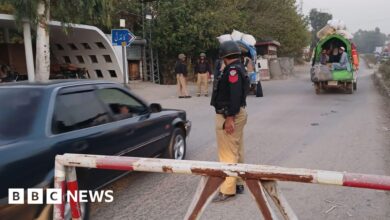Chidimma Adetshina’s participation sparks controversy over nationality
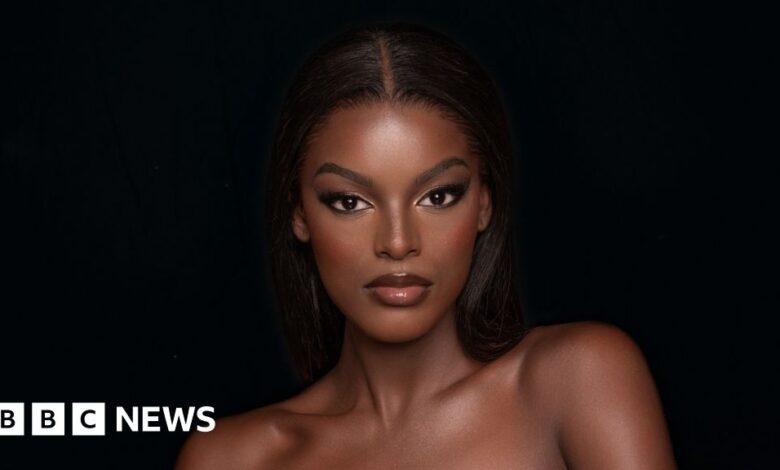
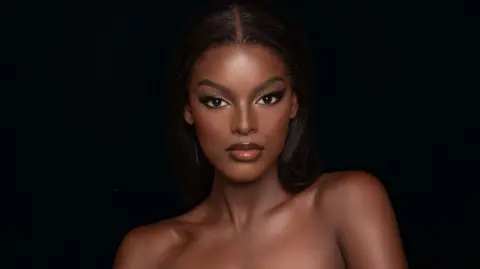 Miss South Africa
Miss South AfricaWhen law student Chidimma Adetshina won a coveted spot in the Miss South Africa final, her victory sparked a backlash, exposing a deep-seated xenophobia among some South Africans.
The 23-year-old’s name hints at her Nigerian connections, but internet sleuths wanted to know more and dug into every corner of her life. They discovered that her father is Nigerian and that although her mother is South African, her family hails from neighboring Mozambique.
“On behalf of the people of South Africa, we do not recognise her and that name! She should start packing her things and go home,” one angry commenter on X said.
But where is home? Ms Adetshina is South African, according to pageant organizers. She has said in interviews that she was born in Soweto – a township next to Johannesburg – and grew up in Cape Town.
However, the “go home” sentiment, and even harsher criticism, flooded social media, with a petition calling for her to be removed from the popular TV competition gathering more than 14,000 signatures before being taken down.
Culture Minister Gayton McKenzie, leader of the Patriotic Alliance party, which joined the coalition government and made migration a key part of its platform, has spoken out.
“We really can’t have Nigerians participating in our Miss South Africa pageant. I want to know all the facts before commenting but it already feels funny,” he told X.
The issue has touched the hearts of South Africans, and not just who will appear on stage in next week’s final.
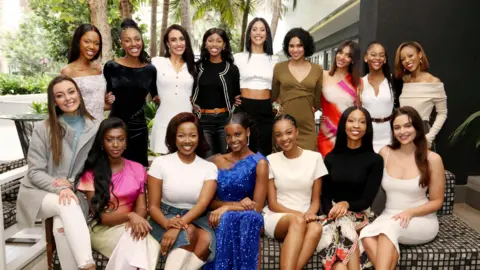 Yolanda van der Stoep
Yolanda van der StoepMs Adetshina declined the BBC’s request for an interview but told news site Sowetan Live that the online hate she faced made her think twice about competing.
“I represent a country, but I don’t feel the affection from the people I represent,” she said.
The whole situation resembles “black-on-black hatred,” Ms Adetshina added, highlighting a particular form of xenophobia in South Africa known as “afrophobia,” directed at other Africans.
She felt she was not the only contestant among the 16 other contestants with foreign-origin names – there were several with South Asian and European names – but she was the one who received the majority of criticism.
When asked to respond to the comments Ms Adetshina faced, a spokesperson for Miss South Africa did not respond directly, only saying she was eligible to compete.
This isn’t the first time this has happened. For Melissa Nayimuli, a Miss South Africa contestant last year, it brought back difficult memories.
The 28-year-old woman was also the target of fierce criticism from Ms Adetshina simply because her father is Ugandan.
She told the BBC she was not surprised by the reaction she received because she had been through it most of her life.
“That’s what I was trying to run away from, but how can you run away from yourself?” she wondered.
Ms Nayimuli said growing up she regularly spoke Xhosa, her mother tongue and one of South Africa’s official languages, to “prove that I was South African”.
Her voice choked as she admitted that she felt ashamed of her Ugandan roots as a young woman because of the Afrophobia she once suffered from.
“I didn’t want people to see me with my father because he had dark skin and recognisable East African features,” she told the BBC.
“At home, my father was my hero, but outside, I saw him treated like an enemy.”
Sociologist Dr Nombulelo Shange of the University of the Free State links this hostility to South Africa’s history of racism and the apartheid regime – which imposed a strict caste system that favored whites.
“There is a sad racism that we are struggling to eradicate as a nation,” she said.
“It shows the deep self-hatred that we, as black South Africans, have always carried within us.”
Dr Shange added that South Africans had internalised oppressive racist arguments such as colourism, where lighter skin was seen as better.
After apartheid ended in 1994, the government led by Nelson Mandela’s African National Congress (ANC) welcomed African migrants and asylum seekers to the country in part to help it reintegrate into the continent after years of isolation.
But with many South Africans struggling financially, foreigners have become targets for some frustrated by their plight.
Zimbabweans, Nigerians and Somalis among others have been accused of taking away opportunities and resources from South Africans.
Michael Morris, communications director at the South African Institute of Race Relations, told the BBC that “there is a perception that outsiders are competitors for scarce jobs, resources, living space and services”.
He said the growing number of successful Africans in South Africa could “easily cause resentment and violence”.
This hostile atmosphere sometimes erupts into attacks. South Africa experienced its worst outbreak of violence against mostly African expatriates in 2008, when more than 60 people were killed.
“There are black South Africans who believe that Africans from other parts of the continent do not belong in South Africa,” Mr Morris said.
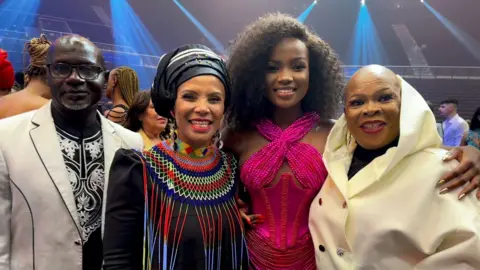 Melissa Nayimuli
Melissa NayimuliMore than a decade ago, Ms. Nayimuli felt this hostility acutely when her father was arrested.
“My dad is the kindest, gentlest person in the entire universe,” she said – but he was treated like a criminal because she believed he looked foreign.
When Ms Nayimuli’s mother went to the police station in the capital Pretoria where her husband was being held, officers could not even provide an explanation or press charges against him.
Her father was released and Nayimuli’s family never spoke of it again.
They often “avoid” the issue of xenophobia they face, but when it erupted during last year’s Miss South Africa pageant, it was an opportunity to address the issue head-on and for Ms Nayimuli, it was part of the healing process.
Now, seeing Adetshina suffer the same level of abuse, she felt compassion.
“She’s not just a trending topic. She’s a human being. She’s a young woman who was bullied online – it’s wrong, it’s hurtful and it’s dangerous,” she said.
But she stressed that xenophobes were in the minority and there were many South Africans calling for unity.
Last week, Julius Malema, leader of the opposition Economic Freedom Fighters (EFF) party, defended Ms Adetshina, saying: “Why do people want to say she is from Nigeria or Mozambique? She was born here.”
This message of unity is the message that Ms Nayimuli conveyed as she concluded her Miss South Africa journey.
Last year, as the spotlight shone on her in the final round of the competition, she called for African unity in the face of hatred.
“Let us step into our power as Africa. We are one,” she told a raucous audience that cheered her message of unity.
But it seems this has not abated as discrimination has recurred.
Next Saturday, Ms Adetshina will have her chance to take the stage, but it remains unclear whether she will directly confront her haters.
You may also be interested in:
 Getty Images/BBC
Getty Images/BBC



